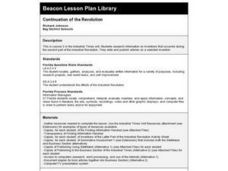National First Ladies' Library
The First Great Awakening
Connecting social studies and American literature, students study the Great Awakening and draw comparisons between its impact on England and on parts of Colonial America. They research the lives and experiences of people who lived during...
Curated OER
U.S. History Worksheet #69
In this United States history activity, middle schoolers utilize a word bank of 10 terms or phrases to answer 10 fill in the blank questions about the Industrial Revolution. A short answer question is included as well.
Curated OER
1848-1914: Can You Name that Age?-
In this European history learning exercise, students read a 2-page selection about the Industrial Revolution, and then respond to 6 short answer questions about the information presented.
Curated OER
Continuation of the Revolution
Fourth graders research important inventions from the second half of the Industrial Revolution. They summarize their research and then write and publish a newspaper style article.
Curated OER
Industrialization Word Search
In this social studies worksheet, students identify and locate vocabulary terms related to the Industrial Revolution and industrialization. There are 36 words located in the puzzle.
Curated OER
Sunken Millions: The Way West
Recover sunken treasure with this interactive PowerPoint! Break your class into two teams: the divers and the surfers. They'll work together to answer 20 multiple choice questions, reviewing major events that occurred during the 1800s....
Curated OER
The Progressive Era: Muckrakers Grade 8
As you explore an excerpt from Upton Sinclair's The Jungle with your class, discuss how his descriptions of the meat-packing industry caught the public's attention and helped to promote change in the Progressive Era.
Curated OER
Child Labor in the Carolinas
Fifth graders explore child labor and how children were exploited and used in the work place. In this Industrial Revolution lesson plan, 5th graders research child labor by reading, looking at photographs and drawing conclusions then...
Skyscraper Museum
Building a Skyscraper
Creating buildings that reach hundreds of feet into the sky is no easy task. The third instructional activity in this series begins with four activities that engage young architects in exploring the major challenges that are faced when...
Curated OER
Industrialization Case Study: Manchester
In this Industrialization world history instructional activity, students answer 10 questions about how industrialization changed the way people lived and worked.
Curated OER
Before the Industrial Revolution
In this European history learning exercise, learners respond to 18 short answer questions about European production, urban centers, and pre-Industrial Europe.
Curated OER
Before the Industrial Revolution
In this European history worksheet, students respond to 16 short answer questions about imports, consumerism, and pre-Industrial Europe.
Curated OER
Environmental Changes
High school scientists reasearch and illustrate changes in the local environment and consider relationships among agriculture, industry, economy, natural events, and social interactions. They construct a timeline to discover if there are...
Curated OER
Writer's Workshop for ESL Students: Refuting an Argument
Thorough and well-organized, this lesson plan helps pupils to weigh, build, and refute an argument (the latter of which is featured here; the first two parts are linked within the resource). Given a simplified argument and counter...
Curated OER
P.O.V.'s Borders Picture Project: Lesson 1 - Air
Take photos of human activities that impact air quality. Collaborative groups present one of the photographs, identifying how the activity contributes to air quality and what can be done to minimize the impact. As one in a series of...
Penguin Books
A Teacher's Guide to the Signet Classics Edition of H.G. Wells's The Time Machine
Imagine being able to travel back and forth in time! H.G. Wells uses that scenario in his novel The Time Machine to comment on what he saw as the flaws in Victorian society and the industrial age. This teacher's guide is one of the best...
Curated OER
Handwriting about the Industrial Revolution
In this handwriting about the Industrial Revolution worksheet, students trace the letters to practice writing a sentence about the Industrial Revolution.
Curated OER
U.S. History: Industrialization and Entrepreneurship
Eleventh graders investigate industrialization and explain how laissez-faire policies influenced entrepreneurship. On bubble maps, 11th graders locate causes of industrialization. In an activity/demonstration, students role-play as...
Curated OER
Urban Growth in Industrial America
Students examine the correlation between urbanization and industrialization. In this 19th century American history lesson plan, students investigate census data from the late 1800's to find out how urbanization and industrialization in...
Curated OER
Worksheet #82 - Industrial Inventions
In this industrial inventions instructional activity, students expand their knowledge through ten fill in the blank questions that relate to the aforementioned topic.
Curated OER
Technology: Mass Production and Standardization
Students explore standardization and mass production by creating verbal visual vocabulary tables. They discover how industrial inventions increase profits for businesses. Students create three-tiered definition concept trails using...
Curated OER
Making Cloth: The Impact of Technology
Young scholars analyze and discuss several primary source documents that address the changes in technology that affected New England agricultural communities in the early 19th century. They also identify and discuss historical contexts...
Curated OER
Comparing Primary Sources from the Industrial Revolution
Tenth graders, in teams, analyze, evaluate and describe primary sources pertaining to industrialization at the turn of the century. They examine the sources and answer questions about each.
Curated OER
The Industrial Revolustion
Students create artistic posters to show the differences between key vocabulary words. They show the differences between a rural, agrarian, urban, and industrial lifestyles. They evaluate the benefits and problems, the human and...

























